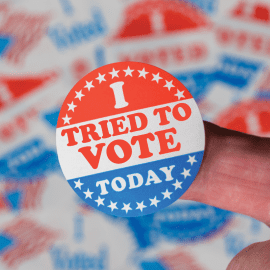After the State of Alaska rejected more than 7,500 ballots in the June special primary election, the Native American Rights Fund (NARF), ACLU of Alaska, and Lawyers’ Committee for Civil Rights Under Law are demanding solutions from Alaska’s leaders before this fall’s elections.
 About 63 percent of rejected ballots were not counted because of defects that could have been corrected. Rejection rates were significantly higher in rural areas, where percentages of Alaska Native voters are substantially higher.
About 63 percent of rejected ballots were not counted because of defects that could have been corrected. Rejection rates were significantly higher in rural areas, where percentages of Alaska Native voters are substantially higher.
The demand letter sent on July 19, 2022, states: “No one who makes a good faith effort to vote should have their ballot discarded without having a chance to fix an easily remedied mistake. That is why, as we move towards elections in August, October, and November, we urge you to ensure that all Alaskans who vote absentee can count on their vote counting by promptly notifying voters that their ballot was rejected and why, and providing them an opportunity before Election Day to remedy any curable defects that caused the rejection.”
Nearly half the states, as well as the Municipality of Anchorage, have secure elections with a codified process to ensure that the voices of voters are not silenced for a clerical error. But the State of Alaska continues to reject curable ballots year after year despite the obvious disenfranchising impact resulting from a lack of cure.
“The significantly higher rejection rates in rural Alaska reflect disparate impacts on Alaska Native voters who already face increased barriers to voting. It is critical that a meaningful ballot cure process be in place to ensure that the votes of all Alaskans are counted,” said NARF Staff Attorney Megan Condon.
“The right to vote is the most fundamental constitutional right because democracy cannot exist without the electoral participation of citizens. It’s the people who are supposed to shape our government, not the other way around. When voters are disenfranchised, like we saw in the special election, the result is a compromised democracy that doesn’t reflect the will of people,” said ACLU of Alaska Legal Director Stephen Koteff.
The groups have asked the State of Alaska to inform them within seven days about how it intends to resolve the issue before further legal action is taken.
More blog posts

